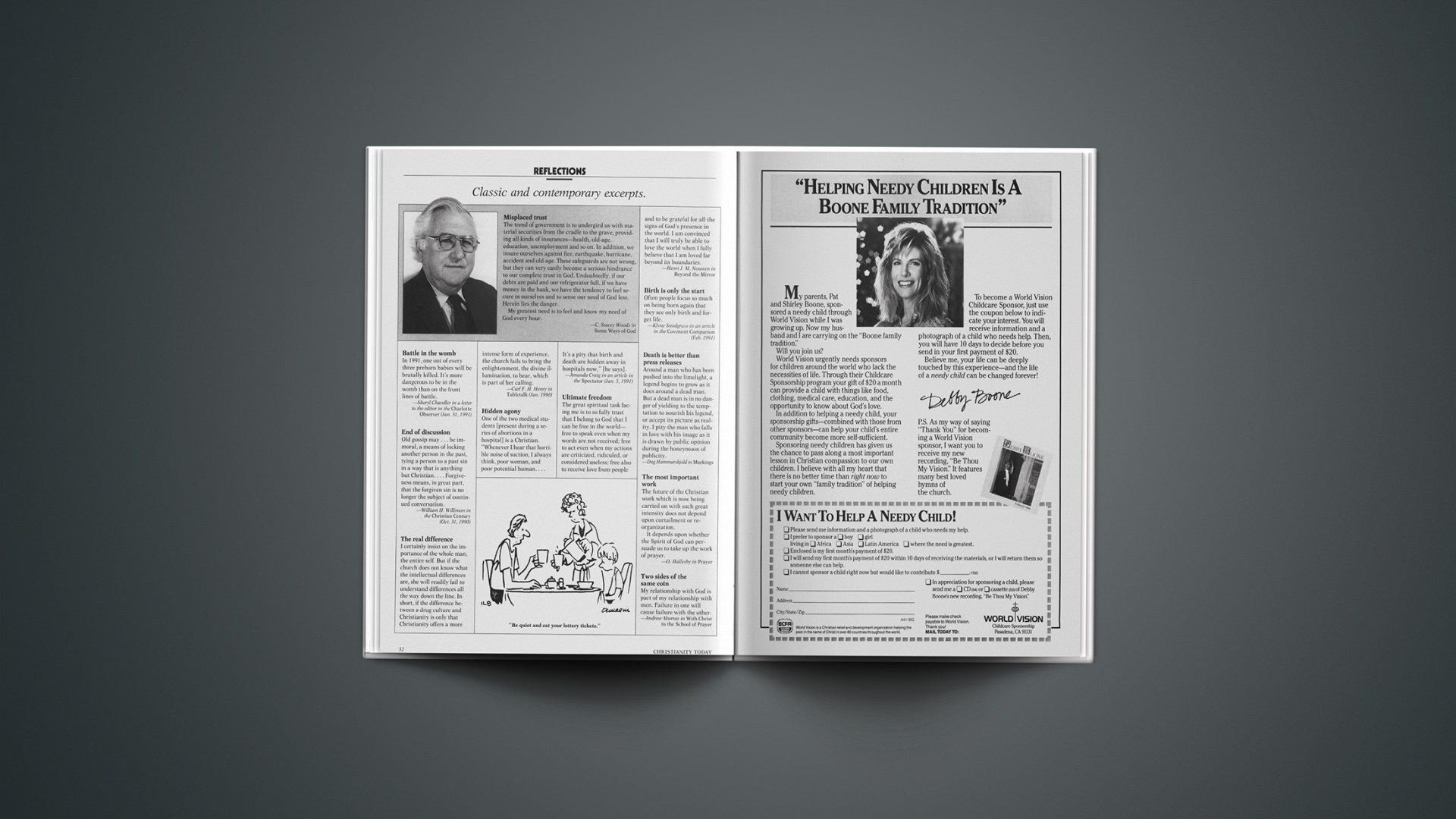Misplaced Trust
The trend of government is to undergird us with material securities from the cradle to the grave, providing all kinds of insurances—health, old-age, education, unemployment and so on. In addition, we insure ourselves against fire, earthquake, hurricane, accident and old-age. These safeguards are not wrong, but they can very easily become a serious hindrance to our complete trust in God. Undoubtedly, if our debts are paid and our refrigerator full, if we have money in the bank, we have the tendency to feel secure in ourselves and to sense our need of God less. Herein lies the danger.
My greatest need is to feel and know my need of God every hour.
—C. Stacey Woods in Some Ways of God
Battle in the womb
In 1991, one out of every three preborn babies will be brutally killed. It’s more dangerous to be in the womb than on the front lines of battle.
—Sheryl Chandler in a letter to the editor in the Charlotte Observer (Jan. 31, 1991)
End of discussion
Old gossip may … be immoral, a means of locking another person in the past, tying a person to a past sin in a way that is anything but Christian.… Forgiveness means, in great part, that the forgiven sin is no longer the subject of continued conversation.
—William H. Willimon in the Christian Century (Oct. 31, 1990)
The real difference
I certainly insist on the importance of the whole man, the entire self. But if the church does not know what the intellectual differences are, she will readily fail to understand differences all the way down the line. In short, if the difference between a drug culture and Christianity is only that Christianity offers a more intense form of experience, the church fails to bring the enlightenment, the divine illumination, to bear, which is part of her calling.
—Carl F. H. Henry in Tabletalk (Jan. 1990)
Hidden agony
One of the two medical students [present during a series of abortions in a hospital] is a Christian. “Whenever I hear that horrible noise of suction, I always think, poor woman, and poor potential human.… It’s a pity that birth and death are hidden away in hospitals now,” [he says].
—Amanda Craig in an article in the Spectator (Jan. 5, 1991)
Ultimate freedom
The great spiritual task facing me is to so fully trust that I belong to God that I can be free in the world—free to speak even when my words are not received; free to act even when my actions are criticized, ridiculed, or considered useless; free also to receive love from people and to be grateful for all the signs of God’s presence in the world. I am convinced that I will truly be able to love the world when I fully believe that I am loved far beyond its boundaries.
—Henri J. M. Nouwen in Beyond the Mirror
Birth is only the start
Often people focus so much on being born again that they see only birth and forget life.
—Klyne Snodgrass in an article in the Covenant Companion (Feb. 1991)
Death is better than press releases
Around a man who has been pushed into the limelight, a legend begins to grow as it does around a dead man. But a dead man is in no danger of yielding to the temptation to nourish his legend, or accept its picture as reality. I pity the man who falls in love with his image as it is drawn by public opinion during the honeymoon of publicity.
—Dag Hammarskjöld in Markings
The most important work
The future of the Christian work which is now being carried on with such great intensity does not depend upon curtailment or reorganization.
It depends upon whether the Spirit of God can persuade us to take up the work of prayer.
—O. Hallesby in Prayer
Two sides of the same coin
My relationship with God is part of my relationship with men. Failure in one will cause failure with the other.
—Andrew Murray in With Christ in the School of Prayer










